|
|
Blog Roll Continued: Previous <
2 > Next
<Home> < 8 > <
7 > < 6 > <
5
>
< 4 >
< 3 > <
2 > <
1 >
|
|
|
|
|
Panel 6: How does
Empathy Show up in Your Restorative Justice Work? |
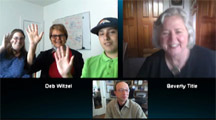 |
Deb Witzel
Rhea Blash
Laura Snider
Beverly Title
Edwin Rutsch |
1. How do you all think restorative justice helps
build empathy? Do you have a story of when you saw it or felt it?
2. When you are sitting in a restorative justice process how do
you know when empathy is happening?.
3. What ways do you work to build empathy when doing restorative
justice?
4. What else would you like to say about restorative justice and
empathy?
Sub Conference:
Justice. |
|
|
|
|
|
Kathryn Lee:
How to Build a Culture of Empathy with Education
|
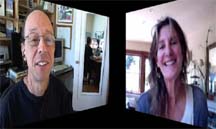 |
|
Kathryn Lee is Director of Innovation, Partnerships, and
Service at Prospect Sierra School in El Cerrito, California. She was an
organizer of the
'TEDxGoldenGateED: Compassion and Education Conference'
held in Richmond, California which had over 700 attendees. Prospect
Sierra is an innovative school that has been at the forefront of
incorporating empathy and compassion into it's curriculum including the
Root's of Empathy,
the StartEmpathy programs, etc.. |
How can we build a culture of empathy?
Celebrate, Educate, Discover, and Uncover. I believe that empathy
is not only a muscle that needs regular exercise to stay strong, but
that there are stages in the development of empathy, and essential
skills to be learned. For example, if you feel for other people,
but your speech doesn't convey that, then you might not really be
helping to create a more empathetic society.
Also, to be an effective communicator
in the world, one must know how to listen for understanding, convey
that in words and body language, AND have advocacy skills. We can't
listen our way out of a problem. Sometimes empathy requires strong
action -- compassion -- and it might not always be cum-by-ah.
Sub Conferences:
Education
|
|
|
|
|
|
Bhismadev Chakrabarti:
How to Build a Culture of Empathy with Science
|
 |
|
Bhismadev Chakrabarti
heads
a research group at the Centre for Integrative Neuroscience and
Neurodynamics at the University of Reading, UK. The group studies emotion
perception, empathy, and autism using functional MRI, eye gaze tracking,
and psychophysiology. He works in collaboration with the Autism
Research Centre at the University of Cambridge. Bhisma
shared his insights into the physical nature of empathy and how we can
build a culture of empathy.
|
"Empathy is the lens through which we view emotions in others. The highly
empathic can sense others' emotions automatically, while those with
lower empathy are
often marked by a deficit in picking up socio-emotional cues from other
people. Empathy exists in a continuum across the population, and our
research here targets the following questions:
a) how does empathy influence the perception of emotions in others and
in ourselves?
b) what are the neural and behavioral processes underlying empathy?"
Sub Conference:
Science:
Neuroscience.
|
|
|
|
|
|
Charles Eisenstein: How to Build a Culture of Empathy with
Sacred Economics
|
 |
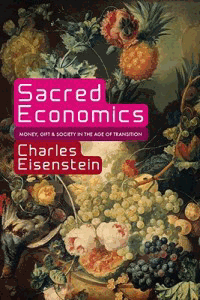 |
Charles Eisenstein is a teacher, speaker, and writer focusing on themes of
civilization, consciousness, money, and human cultural evolution.
He is author of: Sacred
Economics: Money, Gift, and Society in the Age of Transition.
Sacred Economics traces the history of money from ancient gift economies
to modern capitalism, revealing how the money system has contributed to
alienation, competition, and scarcity, destroyed community, and
necessitated endless growth.
|
David Hazen
(author,
Love Always Wins:
Hope for Healing the Epidemic of Violence) and Edwin Rutsch,
interview
Charles about how to transform society and build a culture of empathy.
How to move from a culture of separateness, alienation, greed and
selfishness to empathy, gift, connection and love.
|
|
|
|
|
|
Erika Rosenberg:
Dialogs on How to Build a Culture of Empathy with Education |
 |
 |
Erika Rosenberg offers scientifically-
and practically-based training and consultation in a wide range of
areas associated with the study and/or understanding of human
emotion, facial expressions of emotion, and the improvement of
emotional functioning through meditation.
|
Erika has been practicing meditation for
over 20 years. She is a senior teacher for Project Compassion at
the Center for Compassion and Altruism Research and Education
(CCARE) at Stanford University where she teaches the 9-week
Compassion Cultivation Training (CCT). The training combines
science, mindfulness and Compassionate Communications traditions.
Sub
Conference: Science and
Education
|
Jim
says we have to go beyond mindfulness to
a
transcendent
connection between people. We can get beyond loneliness, isolation
and depression to have a more
sustained happiness, by contributing to the wellbeing of others.
Sub Conference:
Science
|
|
|
|
|
|
Leah
Weiss Ekstrom: Dialogs on How to Build a Culture of Empathy & Compassion
|
 |
 |
Leah Weiss Ekstrom is a Contemplative Educator whose
research and teaching focuses on the application of meditation in secular
contexts.
Currently, Leah is Director of Compassion Education at Stanford's
Center for Compassion and Altruism Research and Education (CCARE). |
Leah directs the CCARE: Compassion Training Course (CTC) professional
education program as well as other educational initiatives such as the
application of compassion meditation in schools.
"The
Compassion Training Course is a nine-week program designed to develop
the qualities of compassion, empathy, and kindness for oneself and for
others. The CTC integrates traditional contemplative practices with
contemporary psychology and scientific research on compassion. The
program was developed at Stanford University by a team of contemplative
scholars, clinical psychologists, and researchers."
Sub Conferences:
Education
|
|
|
|
|
|
Joey Katona: How to Build a Culture of Empathy in Education
|
 |
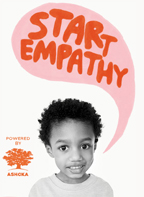 |
Joey Katona is the Project Manager for the Empathy Initiative (StartEmpathy.org)
at the world’s leading social entrepreneurship organization, Ashoka. He
leads a small core team working to launch the Empathy Initiative in the US
and globally. He participates in the strategic development of the start-up
and works to creatively manage the day-to-day operations. |
Joey develops
ways to help the team stay on track toward its goals -- coordinating,
sourcing, and following up on various partner and funder leads and
helping manage external relationships. "Start Empathy, is
a community of individuals and institutions dedicated to building a
future in which every child masters empathy...
Start Empathy is not out to build a single program,
curriculum, or silver-bullet fix. Rather, we're working to unleash
demand for empathy as a core 21st century skill – collaborating with
social entrepreneurs, educators, parents, and key players in the media,
business, and academic sectors to make empathy as essential as reading
and math in early education. Success will take all of us, and will
require rethinking how we parent, educate, and raise our children in a
world that is changing faster than ever before. "
Sub Conferences:
Education
|
|
|
|
|
|
Laura Zax:
Dialogs on How to Start Building a Culture of Empathy in Education
|
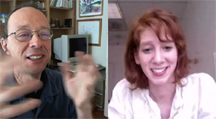 |
 |
Laura Zax is Editor of the
StartEmpathy.org website. Start Empathy, an initiative of
Ashoka, is a community of
individuals and institutions dedicated to building a future in which every
child masters empathy. Laura is also
CEO & Co-Founder - The Nighttime Adventure Society. "I make music and
mischief". |
"Empathy is critical both to individual human development and to our
collective ability to solve problems and build a stronger society.
Cultivating empathy can start with really simple actions, like taking
the time to stop, breathe, and listen when your child comes to you with
a problem. It can start with a bedtime story. It can start by
understanding what your strengths are as a school or as a teacher, and
in honing in on ways you can embed empathy into your teaching, culture,
and behavior. The bottom line: it can start today."
Sub Conferences:
Education
|
|
|
|
|
|
Meg
Lyons: How to Build a Culture of Empathy & Compassion with
Charter for Compassion Pakistan
|
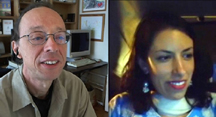 |
 |
Meg Lyons is
Executive Officer of the
Charter for Compassion in Pakistan. Meg talked to us via her laptop while
being driven through the streets of Karachi, Pakistan at night. It really
brought home the power of communications technology to bring people
together. |
Meg talked about her value of courage
and authenticity, as well as, about her work of promoting the Charter for
Compassion in Pakistan.
'The Charter of Compassion is a cooperative effort to restore not only
compassionate thinking but, more importantly, compassionate action to
the center of our lives. Our programs, tools, and activities allow our
stakeholders and partners the opportunity to explore the value of
collaboration, empathy, and compassion within their own respective
entities, and institutionalize these positive changes across all
sections of society. '
Sub Conferences:
Education
|
|
|
Muna
Awad: Building Empathy with Charter for Compassion - Jordan
|
 |
 |
Muna
Awad is
Programs Director at the
Charter for Compassion-Jordan.
She has 15 years of experience working in
education as teacher, trainer and private tutor. She worked as head of
department for training youth. |
Muna
developed creative positive parenting tools: “Mother’s ToolBox” to help
parents creatively overcome the challenges they face raising their children
and be able to inspire them to become better people. She feels
education is the best way to build a culture of empathy and compassion .
Sub Conferences:
Education
|
|
|
|
Carolyn Pedwell:
Dialogs on How to Build a Culture of Empathy
|
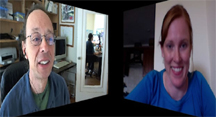 |
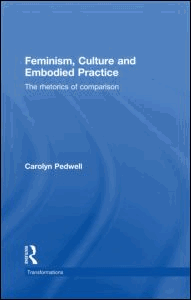 |
Carolyn Pedwell is a
Lecturer in Media and Cultural Studies,
School of Arts and Cultures,
Newcastle University
in the UK. Author
Feminism,
Culture and Embodied Practice: The Rhetorics of Comparison.
Forthcoming Book: Affective Relations: The Transnational Politics of
Empathy. |
How to build a culture of empathy? .Realizing that 'empathy' is not one thing and that it may not always
be positive. A critical approach to thinking through the politics of
empathy needs to consider the ways in which empathy may produced,
mobilized and be felt differently across different times, spaces and
contexts. It also needs to take into account the risks and
contradictions of practices of empathetic engagement, as well as their
more productive possibilities. Rather than thinking about
empathy as a discrete or singular emotion, I'd recommend that we think
more critically about the ways in which it is linked with other
emotions, such as power, shame, etc.
Sub
Conference: Science
|
|
|
|
Susan
Partnow: Dialogs on How to Build a Culture of Empathy & Compassion
|
 |
 |
 |
Susan Partnow is an organizational development and training
consultant and teaches
Compassionate Listening and many other |
empathy and compassion building processes Contributor
to the book: Practicing the Art of Compassionate Listening
How to Build a Culture of Empathy & Compassion?
1. Set the Intention (value it; talk about it; name and invite it).
2. Slow down to the speed of wisdom to make
space for it.
3. From the Inside Out: Cultivate self awareness and regulation - know
your triggers; do the practice with compassion & BE Compassion.
4. Build community from these principles - to embrace conflict,
differences, challenges as opportunities to deepen intimacy,
understanding, connection - and find creative solutions like Restorative
Circles.
Sub Conferences:
Education
|
|
|
|
Jan
Hutton: Dialogs on How to Build a Culture of Empathy and Compassion
|
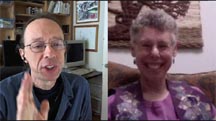 |
 |
Jan has served as a community organizer, social
worker in hospice and hospital settings, meditation teacher, group
facilitator in the Quaker community and, she hopes, a ‘kind’ person. The
guiding principle for Jan’s work as a facilitator is, “How do we look at
those who differ from us and see our shared humanity?”
|
She
offers Compassionate Listening Training with the
strong belief that implementing peacemaking in the public sector makes
it vital that we practice, heart to heart, that very same peacemaking
in our personal lives. To build a culture of empathy we each
take responsibility for acknowledging the fear that our own hearts
might break when empathizing with someone else's pain?
Sub Conferences:
Education
|
|
|
|
Patricia
Jennings: How to Build a Culture of Empathy in Education
|
 |
|
Patricia (Tish) Jennings is Co-Leader of the "Program on Empathy Awareness and
Compassion in Education (PEACE)" at Penn State University.
"The PEACE area seeks
to promote health and wellbeing in children, youth and families through the
scientific understanding and promotion of awareness, compassion and
empathy. The program includes faculty, research associates and students
whose work focuses on developing a strong multidisciplinary science in this
emerging area. |
PEACE supports
interdisciplinary scholarly activities ranging from theoretical essays
to basic research on the development of awareness, compassion and
empathy, to the design and evaluation of interventions intended to
foster these attributes in individuals and relationships."
Sub
Conferences: Science
and
Education
|
|
|
Dahlia Lithwick: How to Build a Culture of Empathy on the Supreme Court
and Beyond
|
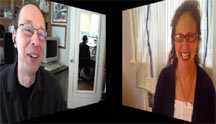 |
|
Dahlia Lithwick writes about the courts and the law for
Slate and
is a commentator on various national media programs such as NPR, Rachael
Maddow Show, Democracy Now, etc. She has written and commented on the role of empathy
in relationship to the Supreme Court, same-sex
marriage and woman's issues. |
There was a
great deal of contention
and confusion about the nature of empathy during the last Supreme
Court nomination hearings. We talked about preparing now, for the next
Senate discussions and debates about the role of empathy in the justice
system and Supreme Court.
"When Obama talked about
empathy in “The Audacity of Hope,” he was very, very clear. He
didn‘t want judges to make stuff up so that the poor guy wins. What he
said is, put yourself in the other person‘s shoes, right? That was his
mom‘s credo.
When he talks about
empathy, I think all he‘s saying is, just listen. Listen to what
the other side is saying. See if there is merit to their argument.
And then think it through."
Sub
Conference: Justice and
Media
|
|
|
Howard
Zehr: How to Build a Culture of Empathy with Restorative Justice
|
 |
 |
Widely known as “the grandfather of restorative justice,”
Zehr began as a practitioner and theorist in restorative justice in the
late 1970s at the foundational stage of the field. Author of many books
including
The Little Book of Restorative Justice. |
We talked about the role of empathy as a foundational value in the
restorative justice movement. Edwin thinks a more accurate term would be
restorative empathy. Howard has said, "This vision of mutuality is
supported by neuro science and attachment theory. The new neuro science
is teaching us that we as a human being, our brains are designed to
connect with other people."
Sub Conference:
Justice
|
| |
|
Stanford University Conference: Happiness Within Reach from
Empathy & Compassion |
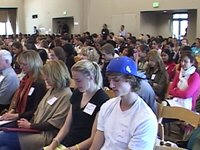 |
|
A one day long conference on
happiness at Stanford University. The importance of empathy,
self-compassion, compassion and connecting with others to being
happy was a constant theme.. "And it turns out that this fear of having compassion for yourself
is strongly correlated with fear of having compassion for others,
and a lack of willingness to extend compassion to others. Self
compassion is not letting ourselves off the hook and being self
indulgent, it's about choosing to use our own happiness and our own
desire for meaning and connection with others as our primary
motivation, as opposed to using guilt shame and fear as our primary
motivation." |
|
|
|
Debbie Custance:
Study on Dogs having Empathy for People in Distress
|
 |
 |
Debbie Custance is a lecturer at Goldsmiths College,
Department of Psychology, London. She coauthored a study titled,
'Empathic-like responding by domestic dogs to distress in
humans: An exploratory study'. |
The study tested how dogs respond to someone pretending
to cry and be in distress. The majority of dogs came over to the
person crying in a way that seemed to express empathic
concern. "When the stranger pretended to cry,
rather than approaching their usual source of comfort, their owner, dogs
sniffed, nuzzled and licked the stranger instead. The
dogs’ pattern of response was behaviorally consistent with an expression
of empathic concern..."
Sub Conference:
Science and
Animals & Nature.
|
|
|
|
Stanley Coren: How to Build a Culture of Empathy with Dogs
|
 |
 |
Stanley Coren is Professor Emeritus in the Department of
Psychology at the University of British Columbia.
He is the author of many best-selling
books on dogs
including,
'How Dogs Think: Understanding the Canine Mind',
'How To Speak Dog'
and
'The Modern Dog'.
|
Stanley
says empathy is the glue that connects us and that "there is a consensus
that the mind of a dog is very similar in capacity and behaviors to the
mind of a human 2 to 3-year-old."
"Recent research demonstrates that dogs have empathy and
recognize when humans are emotionally distressed. Their response is an
attempt to comfort the unhappy person as best they can."
One way to foster empathy in children is
for children to have a dog, which helps them learn how to connect and
relate to others. The dog will not judge them but offers empathic
connection.
Sub Conference:
Animals & Nature
|
|
|
|
Lee Charles Kelley:
How to Build a Culture of Empathy with Dogs
|
|
 |
|
Lee Charles Kelley is a dog trainer and has written articles
about empathy in dogs. He writes a blog in Psychology Today called
'My
Puppy, My Self: How dogs make us human'. Lee and I talked
about the nature of empathy in dogs from Lee's perspective of working with
dogs as a trainer and having been an actor. We also reviewed the study,
'Empathic-like responding by domestic dogs to distress in humans', by
Debbie Custance,
and the related articles by
Stanley Coren
and Kevin Behan.
Sub Conference:
Animals & Nature |
|
|
|
Dennis Tirch:
How to Build a Culture of Empathy & Compassion
|
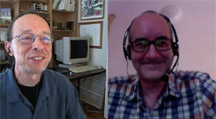 |
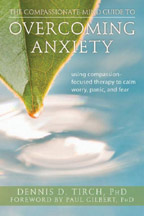 |
Dennis Tirch is a compassion focused psychologist
specializing in the practice of awakening.
He is
Associate Director, American Institute for Cognitive Therapy as well as,
Founder and Director of The Center for Mindfulness and Compassion Focused
Therapy. |
We held a wide ranging discussion about how to foster empathy and
compassion in society. Dennis is author of:
The Compassionate Mind Approach to Overcoming Anxiety.
There are many factors that contribute to developing a mind that is
prone to intense anxiety, and if you have such a mind, there are many
things you can do to change the way it works. Research has shown that
practicing kindness and compassion soothes experiences of fear, while
self-critical thoughts tend to intensify them.
Sub Conferences:
Science
|
|
|
|
Keiko
Krahnke: How to Build a Culture of Empathy in Business
|
 |
|
Keiko Krahnke is
Associate Professor of Management; Business Communications at
University of Northern Colorado in the Montfort College of Business.
Areas of research interests include spirituality and business, systems
thinking, Appreciative Inquiry, and corporate citizenship. Currently
interested in learning about human consciousness and teaching empathy and
compassion. |
She says, Empathy is wholeness and knowing that we are all part of one
field and are interconnected. The opposite of Empathy is being trapped in narcissism.
Coauthor: Empathy, Connectedness and Organisation. 'In
this paper, we conceptually explore the role of empathy as a
connectedness organising mechanism. We expand ideas underlying positive
organisational scholarship and examine leading-edge studies from
neuroscience and quantum physics that give support to our claims. The
perspective we propose has profound implications regarding how we
organise and how we manage. First, we argue that empathy enhances
connectedness through the unconscious sharing of neuro-pathways that
dissolves the barriers between self and other.'
Sub Conferences:
Education and
Workplace
|
|
|
Anita
Nowak: PhD Dissertation: Pedagogy of
Empathic Action as Informed by Social Entrepreneurs
|
 |
|
In this interview, Anita Nowak talks about her PhD
dissertation titled 'Introducing a Pedagogy of Empathic Action
as Informed by Social Entrepreneurs.''
"I contend that our innate human empathy can be leveraged as a tool of
social change through the practice of Empathic Action. Furthermore I argue
that a Pedagogy of Empathic Action offers the best means by which to
foster this." |
Anita works to
address five questions; What is empathy?
What is Empathic Action?
Acting on empathy for another/others.
What group of individuals is already
practicing Empathic Action?
How might narrative inquiry
interviews with such individuals inform a Pedagogy of Empathic Action? What are the broad strokes of such a
pedagogical approach?
Sub Conferences:
Education and
Workplace
|
|
|
Art
Markman: How to Build a Culture of Empathy with Science
|
 |
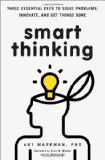 |
Art Markman, PhD is a cognitive scientist at the University
of Texas. He writes blog entries for Psychology Today, Huffington Post,
Harvard Business Review, and YouBeauty.com.
Author. Smart Thinking: Three Essential Keys to Solve Problems, Innovate,
and Get Things Done |
"Why Empathy
Makes You More Helpful. There is a lot of research suggesting
that empathy increases people’s desire to help others. Empathy is the
ability to share other people’s emotion. The better able you are to feel
what someone else is feeling, the more likely you are to want to help
them when they are in a difficult situation. This ability also extends
to animals. We are able to project feelings onto animals like dogs, and
that increases our need to help them. But, what is it about empathy
that promotes the need to help?"
Sub
Conference: Science
|
|
|
|
Sam
Vaknin: How to Build a Culture of Empathy with Psychopaths & Narcissists?
|
|
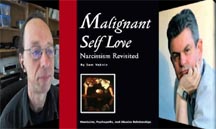 |
|
Sam writes and speaks about
psychopathy & narcissism. He's the author of
Malignant Self
Love: Narcissism Revisited. He describes himself as a person
devoid of empathy. "I do not possess empathy: I am a thrice-diagnosed
psychopathic narcissist."
Narcissists and psychopaths lack empathy. This deficiency renders them
emotionally and cognitively crippled. They exploit, manipulate, and abuse
other people because they are unable to relate to them otherwise.
He says there are two type of empathy, one is 'cold empathy', it's
metaphorically like a library of books with no emotion. Psychopaths &
Narcissists have this quality of empathy but do not see (or care) how their
actions affect others. |
|
|
Lisbeth
Holter Brudal: Dialogs on How to Build a Culture of
Empathy in Norway |
 |
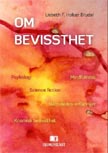 |
Lisbeth Holter Brudal is a psychologist living in Oslo,
Norway. She is the author of many books, including,
Om bevissthet (About
Consciousness) which is about psychology, mindfulness, science fiction,
near-death-experiences and cosmic consciousness
and the terror attack 22.juli 2011 in Oslo.
Lisbeth has developed courses in Empathic Communication. |
One course (20 hours) for professionals who want to use
Empathic Communication in their work and one course (40 hours) for
trainers in the method.The trainers give the 20-hours courses,
one-day seminars introducing the method, participate in different
congresses about education and also give lectures about Empathic
Communication at different university colleges. The trainers also learn
during the 40-hours course how to educate other trainers. Empathic
Communication, as a method, has been presented on Norwegian TV.
Sub Conference:
Education
|
|
|
|
|
|
|
|
|
How to Build a Culture of Empathy with Music Arts
Tal-Chen Rabinowitch
|
|
|
 |
|
|
Tal-Chen is working in Cambridge towards a PhD. Her
research explores the social
nature of musical group interaction in
children and the ways in which it can be directed towards the long-term
enhancement of emotional empathy. This work explores experimentally the
effects of musical group interaction on children’s every day capacity for
empathy, and in particular, the emotional impact of synchronization during
musical interaction. Her research suggests that music promotes empathy.
This work explores experimentally the
effects of musical group interaction on
children’s every day capacity
for empathy.

Violone -
Peter Lely (Wikipedia)
Her research suggests that music
promotes empathy.
Tal-Chen
says her metaphor for empathy is like closing the distance between
people and merging while the opposite is distance and a wall.
Sub Conferences:
Science and
Arts |
|
|
|
Catherine Cadden: Dialogs on How to Build a Culture of Empathy with NVC
|
 |
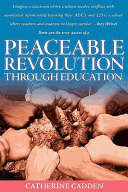 |
Catherine Cadden has been an educator since 1987 finding
alternatives to teaching, learning, and conflict resolution that work with
the principles of nonviolence.
Author of,
Peaceable
Revolution Through Education. The book
offers practical everyday guidance for creating peace
and connection in today's learning environments. |
How can we
build a culture of empathy?
1. Truly releasing enemy imaging that blocks compassion.
2. Remaining curious about each other and letting go our expectations based
on our assumptions and our fixed ideas about how people ought to behave.
3. Being clear about our needs in a way that does not hold them as more or
less important than another's.
Sub
Conference: NVC
|
|
|
|
|
|
Jo Berry:
Dialogs on How to Build a Culture of Empathy
|
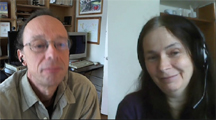 |
|
I
have founded a Charity Building Bridges for Peace, I am a inspirational
speaker and facilitator in conflict resolution and peace building.
I am passionate about finding alternatives to blame and how
to resolve conflict without hurting another human being. I am healing from
losing my Father to terrorism and am transforming my pain into my passion
for peace. I work with Pat Magee who planted the bomb which killed my Dad
and am involved in reconciliation and peace in Northern Ireland and all
over the world. |
I commit to seeing the humanity in everyone and understand
we all have a different story. Peace comes when we see the needs of the
'other' when we stop demonizing any other group but instead take
responsibility for our need to blame another. Through dialogue with emotional safety we can begin to break
down walls and open hearts. I believe in the power of listening with
empathy.
|
|
|
|
|
|
Mary Beth Oliver: Dialogs on How to Build a Culture of Empathy with
Journalism
|
 |
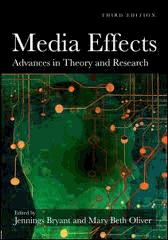 |
Mary Beth
Oliver is a Penn State Distinguished
Professor and co-director of the Media Effects
Research Laboratory, as well as, a member of the Department of Film-Video
and Media Studies.
She is co-author of
Media Effects
Advances in Theory and Research. |
We talked about the role of the media in fostering a culture of empathy.
Needless to say, the media is doing a lot to inhibit empathy at the
moment.
Mary conducted a study titled, 'The Effect of Narrative
News Format on Empathy for Stigmatized Groups'. "The primary aim
of this study was to evaluate the extent to which news story format
(narrative vs. non-narrative) can initiate empathic processes that
produce more favorable evaluations of stigmatized groups." The study
showed that narrative stories stimulate more empathy and compassion.
Sub Conference:
Journalism and Media
|
|
|
|
|
|
Kenneth Barish: How to Build a Culture of Empathy in the Family
|
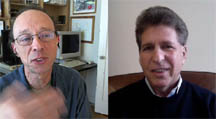 |
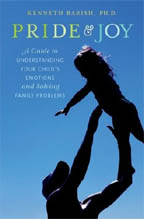 |
Kenneth Barish
is Clinical Associate Professor of Psychology at Weill Medical College,
Cornell University. He is also on the faculty of the Westchester Center for
the Study of Psychoanalysis and Psychotherapy and the William Alanson White
Institute Child and Adolescent Psychotherapy Training Program. He is author
of Pride
and Joy: A Guide to Understanding Your Child's Emotions and Solving Family
Problems. |
How to Build a Culture of Empathy in
the Family?
1) It begins with our relationships with our
children. If we put aside as little as 10 - 15 minutes a day to share in
our children's interests and listen to their concerns, we strengthen
their willingness to listen to others.
2) All real dialogue begins
with our willingness to hear - and make a genuine effort to appreciate -
another person's concerns: their interests, anxieties, and grievances.
3) Then, when our children know that their feelings are valued and
important, we can teach them that so are the feelings of others.
4)
We can include doing for others as a regular part of our family lives.
Sub Conference: Home & Family
|
|
|
|
Michael Kimball: Dialogs on How to Build a Culture of
Empathy with Anthropology
|
 |
|
Michael Kimball
is Associate Professor of Anthropology at the
University of Northern Colorado. In his video 'Recovering Empathy', he
explored the relationship of empathy and the antithesis of antipathy and
apathy. Antipathy is wanting to shut down a threat and fear which are
often caused by unfamiliarity, differences,
ignorance, inexperience and
irrelevance. Apathy is shutting down when we feel powerless. |
Metaphorically, empathy is like an arch bridge. Empathy empowers construction
of a stone arch bridge of interpersonal communication; apathy is the gap
between the sides; antipathy is tensional stress, i.e., underlying
forces trying to pull the connection apart. The Stone arch bridge, like
human survival strategies, has an ancient heritage. The metaphorical
bridge is made of individual stones – moments of shared experience;
outreach efforts; courage to allow oneself to be vulnerable, etc.
Sub
Conference: Science
|
|
|
|
Lesley Grant:
How to Build a Culture of Empathy with Mindfulness with Couples, Parents &
Children
|
|
 |
|
Lesley Grant, founder and director of
Marin Mindfulness
a unique community cooperative program that teaches mindfulness and
loving-kindness practice to parents, teachers and children,
preschool-preteens, speaks about how she is adapting mindfulness and
applied mindfulness practices for children, parents and co-parenting
couples, toward developing a culture of empathy.
She says: “Parents who practice mindfulness can develop the
capacities to raise children who seek creative non-violent solutions to
problems.” Mindful family relationships and both parents and children’s
peer relationships are a foundation of a culture of empathy.
Sub Conference: Education
(Mindfulness) |
|
|
|
|
|
Rick Ackerly:
Dialogs on How to Build a Culture of Empathy with Education
|
 |
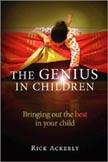 |
Rick is a nationally recognized educator
and speaker with 45 years of experience working in and for schools. With a
master’s in education from Harvard University, Rick has devoted his career
to building thriving learning communities. Author,
"
The Genius in Children: Bringing out the best in
your child"
|
How to build culture of empathy?
'Children have empathy; the best way to educate it is to utilize it.
All good educators know empathy is one of their greatest
abilities, and the origin of some of their greatest passions. Their
brains are designed to know how others feel. They are wired with mirror
neurons; when someone else is hurt, they feel it. By eighteen months
they know that another person might want something different from what
they want, and are inclined to give them what they want, rather than
what they would choose for themselves.'
Sub Conference: Education
|
|
|
|
Matthew Winslow:
Dialogs on How to Build a Culture of Empathy
|
|
 |
|
Matthew Winslow is
Associate Professor in the
Psychology Department at
Eastern Kentucky University.
He teaches a class on empathy in
the filed of
psychology.
Matthew says empathy is like being an actor and the best Halloween
costume ever. He sees empathy as a skill that can be developed with
practice. People need both the motivation to empathize and the ability to
do so. Narcissism is the opposite of empathy because it’s the narrow focus
on the self. The opposite of empathy is wearing mirrored sunglasses on
backwards so you only see yourself.
Sub
Conference: Science |
|
|
|
|
|
David Weinstock:
How to Build a Culture of Empathy with Aikido
|
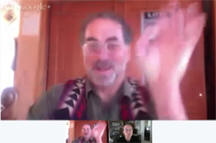 |
|
David Weinstock is a
certified International Nonviolent Communication Trainer, a
Somatic Coach, Aikido Instructor (30 yrs.) and originator of
Somatic Consensus. He leads community workshops in schools,
prisons, businesses, intentional communities & organizations
around the world.
David and his family live in an intentional
community in Washington State that they helped found and where
consensus has been practiced for over 20 years. To learn more you
can go to his website.
|
|
How to build a culture of empathy?
|
|
|
|
|
|
Jesse Wiens: Dialogs on How to Build a Culture of Empathy with Zen NVC
|
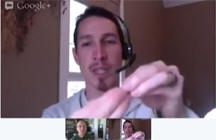 |
|
Jesse Wiens is an internationally recognized Center
for Nonviolent Communication Certified
Trainer and the founder of ZENVC, an approach to the practice of Nonviolent
Communication (NVC) that
integrates meditation, mindfulness, and inner work. He has a passion for
bringing the best of Eastern and Western wisdom to bear on the problems
of today, supporting individuals, couples, and communities to come back
into wholeness. |
How to build a culture of empathy?
- Create opportunities for people to share and bear
witness to each other's celebrations (gratitudes) and mournings
(grief/despair/sadness) in a group.
- Create opportunities for people to share silence
together, and bear witness to their own breath.
- Familiarize yourself with the many ways that people
are disempowered in our culture, and understand how the two
suggestions above empower people; use these understandings as a
springboard to raise questions and spark critical and creative
discussions with others
- Jesse says empathy is like a rubber band.
It gets stretched out and that's fear, anxiety, disconnection, etc. It
automatically comes back into the natural shape.
Sub
Conference: NVC
|
|
|
|
Vinciane Rycroft: Dialogs on How to Build a Culture of Empathy with
Education |
 |
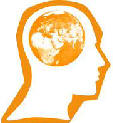 |
Vinciane Rycroft
is
Director and Co-Founder at Mind with Heart,
an educators' network for a secular education in empathy and compassion.The main focus is on creating the conditions for young people to come to a
firm commitment to empathy and compassion based on their own reasoning,
experience and initiative. |
Mind with Heart hosts the Conference,
Empathy and Compassion in Society
in London. The Conference will address
three topics:
1. Compassion and empathy: scientific definitions, misunderstandings and
function.
2. Compassion, the benefits at the personal level.
3. Compassion in action and social cohesion
Sub Conference: Education
|
|
|
|
|
|
Joshua Davis: Empathy Report:
5th Annual Meeting - Social & Affective Neuroscience Society
|
|
 |
|
Josh Davis
is Term Assistant Professor at Barnard College, NY.
His research deals with adaptive emotional state control and mind-body
connections. While not an expert in empathy, in this
interview, Josh gives us a report on some of the latest
findings about the nature of empathy from the 5th Annual Meeting of the
Social & Affective Neuroscience Society.
- Symposium Session A: Empathy
- Empathy
for Positive and Negative Emotions:
- Poster Session D (Empathy, Culture, Social Interaction...)
- Session I Empathy & Choice
Sub Conference:
Science:
Neuroscience
|
|
|
|
|
|
David Hazen & Edwin Rutsch: How
to Build a Culture of Empathy with Peace, Love, Nonviolence
|
 |
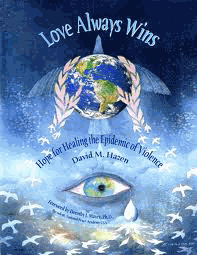 |
David Hazen
is a peace activist living in in Eugene, Oregon.
He is author of,
Love Always Wins: Hope for Healing the
Epidemic of Violence.
He is an Imagineer, Eugene City of Peace. Advisor,
International Cities of Peace. Peacemaker of the Year 2011, Nobel Peace
Laureate Project |
How to build a culture of empathy?
We live in a culture of violence. There is no quick
and easy way out. And yet there is a path for walking away from it, one
step at a time. As far as I know, there is no other way - there is no
shortcut to learning how to love than surrendering to the process,
letting go of old self-serving fears, defenses and rigid beliefs,
letting go of narcissism.
Define the problem,
give up the struggle
and repair the damage.
|
|
|
|
|
|
Jon Ramer:
Dialogs on How to Build a Culture of Empathy & Compassion
|
|
 |
|
Jon Ramer is Co-founder of Compassionate Action Network and
Compassionate Seattle. The mission is, 'Awakening compassion within
ourselves, our children and the world.
He is musician and a tireless organizer and advocate for
fostering empathy and compassion through a wide variety of means around
the world. "Starting from within, working in a circle, in a sacred
manner, we heal and develop ourselves, our relationships, and the
world." The 4th Way Guiding Principles |
|
|
|
|
|
Marcy Axness:
How to Build a Culture of Empathy in the Family
|
 |
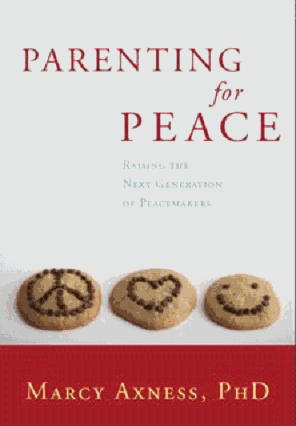 |
Marcy Axness has a private
consulting-counseling practice specializing in mind-body fertility,
pregnancy psychology, adoption, and early parenting. She is author of
Parenting for
Peace: Raising the Next Generation of Peacemakers.
Marcy
also provides training for adoption, education, and mental health
professionals about the latest findings in the science of human thriving. |
How to build a culture of empathy in the family?
1. By giving our children the gift of a well-built brain -- i.e., the
frontal and occipital lobes have the circuitry they need to even process
empathy!! This begins before most people think parenting begins - in the
womb, or even earlier. It is our birthright to experience empathy, and
that right is taken from us if we don't have a well-wired brain.
2. For the child to witness and experience empathy, in an everyday,
all-day way.
3. Model empathy with our own cells, through how we care for ourselves.
Sub
Conference: Home & Family
|
|
|
|
|
|
Jerry Green: How to Build a Culture of Empathy with Emotional Aikido
|
 |
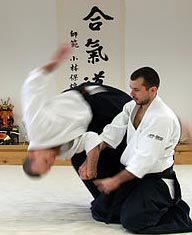 |
Jerry Green is a mediator, and creator of TUNING IN to the
Body, online lessons in embodied compassionate communications, which is
based on his seminars in Emotional Aikido, for transforming pressure, fear
& anger into centered empathy and grounded actions in the home and at
work.
|
The Martial art of Aikido embodies many of the qualities of empathy, such
as, seeing the common humanity of everyone and holding everyone with care.
In this dialog, we talked about the embodiment of empathy through Aikido,
which makes it easier to feel the somatic essence of empathy in our
bodies.
Sub Conference: Aikido & Empathy
|
|
|
|
|
|
California College of the Arts Students Interview Edwin Rutsch on How to
Build a Culture of Empathy
|
|
 |
|
Inspired by your interviews and your belief that
networking and dialoguing is key to creating an empathic culture, I am
reaching out to you with the hope that my team and I could interview
you. I am in an MBA program at California College of the Arts n San Francisco, currently enrolled in a social entrepreneurship
course.
We have chosen empathy as the focus of our semester
project – specifically with the purpose of building individual and
community capacity for empathy in order to foster shared understanding
and spark action on global issues. Catalina Garcia,
Shana Fong, Devin Harvath |
|
|
|
|
|
Luisa
Semedo: How to Build a Culture Based on a Morality & Ethics of Empathy
|
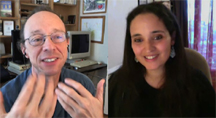 |
|
Luísa
Semedo is a PhD Philosophy student at the University of Paris-Sorbonne,
France. Her
PhD dissertation is about Ethics of Empathy. The aim of her
interdisciplinary work is to frame a new ethics in which empathy is its
foundation (contagion, empathic distress and imitation), its instrument
(simulation, imagination and empathic concern) and its purpose (trust,
altruism, cooperation and respect). |
She says that empathy is
like dreams, because in dreams we can be a different version of ourselves.
In real life, empathy allows us to put ourselves in the place of others,
and experience others lives. Because of our common humanity others are a
possibility of us. The opposite of empathy is a desert island.
Sub Conference:
Science
|
|
|
|
Sam
Chaltain: Dialogs on How to Build a Culture of Empathy in Education
|
 |
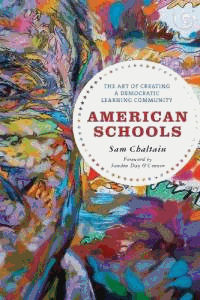 |
Sam Chaltain is a DC-based writer and education activist. He works
with schools, school districts, and public and private sector companies to
help them create healthy, high-functioning learning environments. He is
Author coauthors five books including, American Schools: The Art of
Creating a Democratic Learning Community |
|
|
We talked about how to transform schools to create
culture of empathy. For Sam it's important that all students
feel hear and seen and are able to express themselves.
Sub Conferences:
Education
|
|
|
|
|
|
Ane
Axford & Edwin Rutsch: How to Build a Culture of Empathy with Highly
Sensitive People & Empaths
|
 |
|
Ane Axford specializes in
working with genetically highly sensitive people (HSP).
She hosts websites, a Facebook page, podcasts, workshops and
other resources on this.
Ane says honesty is her most important and value. Honestly sharing your
own feelings is a part of being of empathic. For her empathy
is like a compass, creating a container for intentional and safe
connection for two people to come together on purpose. |
|
How to build a culture of empathy?
Know where you are coming from with your energy, your
focus, and your sensations. Understanding if you are more introverted or
extroverted, more analytical or more feeling based, more sensitive or
more hardy can allow you to know where you are starting from, where
others are starting from, and so where you can come to meet.
Self-Empathy and Self-Compassion. Remember
that HSPs must practice empathizing with themselves and showing
compassion toward themselves in order to really bring that into
experiences with others. Otherwise, they just feel overwhelmed by
other's feelings.
Sub Conference: Empaths
|
|
|
|
|
|
Alice Aird:
Dialogs on How to Build a Culture of Empathy
|
 |
|
Alice Aird
lives in Melbourne, Australia and is Founding Director of the Empathy
Foundation. She hosts the
EmpathyFoundation.Ning.com site for growing empathy and says, " I have come to understand that empathy grows empathy, and that the greater
the human capacity for empathy the greater our ability to cooperate in
creating a peaceful and sustainable world. So that's we what are working on
here at the Empathy Foundation - practicing empathy and growing more of it
in the world. Universal empathy is possible. |
My mission is to create
empathic parenting for purpose. It's a long term project, and may not be
achieved in my life time - I'm sure many others will be involved. Also I
have much healing of my own wounds to do (empathically)."
My top three ways to grow a culture of empathy are;
1. Raise children with empathy,
and grow their empathy centres of the brain.
2. Expand parents/teachers/caregivers awareness of empathy,
it's value, and how to grow it - with great empathy.
3. Honor the unique purpose inside everyone of us, child and adult, and
empathetically support each other in the difficult journey to manifesting
it.
Sub Conference: Home & Family
|
|
|
|
|
|
Stephanie Mattei: How to Build a Culture of Empathy in the
Family
|
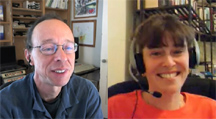 |
|
Stephanie Bachmann Mattei is a
Certified Trainer with The Center for Nonviolent Communication. Parenting
is Stephanie’s niche. Parenting is a powerful and far-reaching tool for
social transformation. Mahatma Gandhi’s said, "If we are to reach real peace in the world, we
shall have to begin with the children.”
Parenting is one of the most crucial ways to bring about social change
in terms of consciousness evolution. We are moving toward a more empathic child rearing. |
How to Build a Culture of Empathy?
Presently the three main unempathic "Parenting Tools" are; Corporal
Punishment, Guilt and Shame inducing communication (verbal and non-verbal),
behavior modification through rewards carrots and sticks. Research show these approaches do not foster empathy and emotional
intelligence. In order to change a habit, we need to know what to put in its place.
We need an empathic parenting approach.
Sub
Conference: NVC and
Sub
Conference: Home & Family
|
|
|
|
How to Build a
Culture of Empathy with Men's Groups: Owen Marcus, Ken Solin, Edwin
Rutsch |
 |
|
A
discussion with Owen Marcus and
Ken Solin, both leaders in the men's
movement, on how to use
micro-communities to teach men empathy and other missing emotional
skills. Both Owen and Ken are long term workshop leaders and have a new
initiative for building a men's movement to foster Masculine Emotional
Intelligence. They hold Man Camp Weekends and have a tool kit where men
can start their own circles.
|
|
Some of the questions addressed in this
dialog were;
-
How would men sitting together shift the ‘culture of empathy’?
-
What is the best way to not just educate men about empathy, but teach
the skill?
-
Why are men behind on the empathy curve?
-
In your Man Camp Weekend you speak about a man “being his own hero” –
what does that mean?
-
How can men learn empathy in one weekend?
"One of the values that I think men in
particular have to pass on is the value of empathy. Not
sympathy, empathy. And what that means is standing in somebody else's
shoes, being able to look through their eyes. You know, sometimes we get
so caught up in "us" that it's hard to see that there are other people
and that your behavior has an impact on them.
And sometimes brothers in particular don't like to feel empathy, don't
like to think in terms of "How does this affect other people?" because
we think that's being soft. There's a culture in our society that says
we can't show weakness and we can't, therefore, show kindness. That we
can't be considerate because sometimes that makes us look weak."
Barack Obama
Sub
Conference: Home & Family
|
|
|
|
|
|
Govert van Ginkel: Survivors of Sexual Assault and Building a Culture of
Empathy
|
 |
|
Govert van Ginkel is speaker, trainer, coach, facilitator
and mediator who is experienced in many different processes. He has a
background as a lawyer.
Govert says, "We thrive on connection and some even say
we are hard wired for connection, yet it can seem so hard to do when you
need it most. Empathy is the missing link. Empathy will help you support
yourself and connect with others in situations in which you normally
would feel lost." |
We held two discussions, first we reviewed, step by step, his article,
Practical Empathy: As it applied to Survivors of Sexual
Assault. He says, "Empathy is a scare commodity in general and
specifically when you are the
victim of a crime. Practical application of empathy can make an enormous
difference in the outcome for both the victim/survivor of a crime, the
effectiveness of police and justice department, as well as, for all
others involved." In the second hour, we had a free style discussion about the nature of empathy and how to
foster it.
Sub
Conference: NVC
|
|
|
|
Stephen Carrick-Davies: How to Build a Culture of Empathy
Online?
|
|
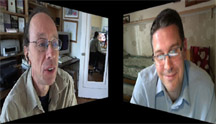 |
|
"I am an independent freelance professional working in the
fast-changing field of new communications technology, predominantly where
it impacts on the lives of children, parenting, schools and the wider
society.
"Just as a programme like "Roots of Empathy" introduced a live baby to
help children re-connect and gain an empathetic understanding and connect
with their feelings so we now need a new understanding, a new "e-pathy" to
remind us of our humanity and curb the actions of many internet users who
risk becoming "comfortably numb." |
|
|
|
|
|
How to Build a Culture of
Empathy? Melanie Swan
|
 |
|
Melanie Swan is founder of DIYgenomics, a
non-profit research organization founded in March 2010 to realize
personalized medicine through crowdsourced health studies and apps. One of
the project is 'Social intelligence genomics & empathy-building'.
It examine whether individuals with certain genetic profiles may have a
greater natural capacity for social intelligence genes which have
been associated with optimism and empathy, extraversion, and altruism.
It has also developed a Personal Virtual Coach mobile app-based intervention for empathy-building.
Sub Conferences:
Science |
|
|
|
|
|
Nick
Walker:
How to Build a Culture of Empathy with Aikido - Autism
|
 |
|
Nick Walker is a speaker, educator, author, and consultant
on a wide range of topics. He is the founder and senior instructor of
Aikido Shusekai, an aikido dojo in Berkeley, California. He holds a 6th
degree black belt in aikido and has been teaching the art to adults,
teens, and children for over thirty years.
He is coleading an empathy training workshop called
Embodying Empathy. He says, empathy is possibly the most important
social skill you possess, yet it can be very fragile. |
It is common to get triggered and lose the capacity to empathize in the
presence of conflict, anger, fear, or anxiety. You may attack or
withdraw, or become unable to think or feel your way to a more useful
response.
The solution: learn to fully embody your empathy so that
it becomes a safe and reliable stance that you can return to in times of
trouble. In this one-day experiential workshop, empathy expert Karla
McLaren and somatic psychologist and aikido teacher Nick Walker will
teach you how to access and strengthen your natural capacity for
empathy.
Sub Conference: Aikido & Empathy
|
|
|
|
Karla McLaren: How to Build
a Culture of Empathy |
 |
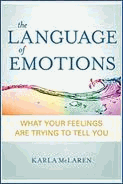 |
Karla
McLaren says, " I’m an author, social science researcher, a cappella
arranger, and an empath, which means I know that I read emotions. I worked
as an empathic healer for twenty-five years, and I once thought that my
empathic skills were mystical....
She is author of,
The Language of Emotions:
What your feelings are trying to tell you.
|
Karla also leads workshops, she says,
"Empathy is possibly the most important social
skill you possess, yet it can be very fragile. It is common to get
triggered and lose the capacity to empathize in the presence of
conflict, anger, fear, or anxiety. You may attack or withdraw, or become
unable to think or feel your way to a more useful response. The
solution: learn to fully embody your empathy so that it becomes a safe
and reliable stance that you can return to in times of trouble."
|
| |
| |
|
Karla McLaren interview on Empaths |
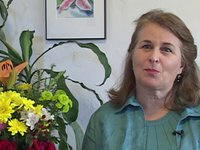 |
 |
"I'm an empath, which means that I am
able to read and understand emotions, You're an empath too - we all
are..."
How do we create a culture of empathy?
- learning about what emotions are.
- watch out for demonization and idealization.
Sub Conference: Empaths |
|
|